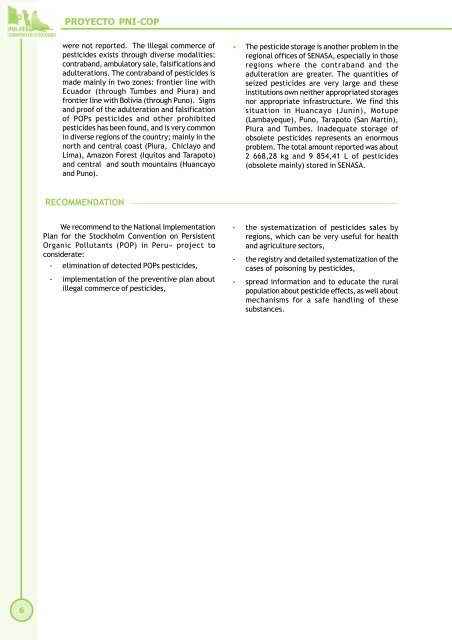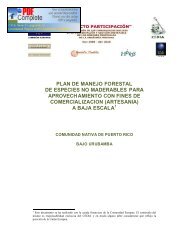Inventario Nacional de Plaguicidas - Ministerio del Ambiente
Inventario Nacional de Plaguicidas - Ministerio del Ambiente
Inventario Nacional de Plaguicidas - Ministerio del Ambiente
You also want an ePaper? Increase the reach of your titles
YUMPU automatically turns print PDFs into web optimized ePapers that Google loves.
6<br />
PROYECTO PNI-COP<br />
were not reported. The illegal commerce of<br />
pestici<strong>de</strong>s exists through diverse modalities:<br />
contraband, ambulatory sale, falsifications and<br />
adulterations. The contraband of pestici<strong>de</strong>s is<br />
ma<strong>de</strong> mainly in two zones: frontier line with<br />
Ecuador (through Tumbes and Piura) and<br />
frontier line with Bolivia (through Puno). Signs<br />
and proof of the adulteration and falsification<br />
of POPs pestici<strong>de</strong>s and other prohibited<br />
pestici<strong>de</strong>s has been found, and is very common<br />
in diverse regions of the country; mainly in the<br />
north and central coast (Piura, Chiclayo and<br />
Lima), Amazon Forest (Iquitos and Tarapoto)<br />
and central and south mountains (Huancayo<br />
and Puno).<br />
RECOMMENDATIONS<br />
We recommend to the National Implementation<br />
Plan for the Stockholm Convention on Persistent<br />
Organic Pollutants (POP) in Peru» project to<br />
consi<strong>de</strong>rate:<br />
- elimination of <strong>de</strong>tected POPs pestici<strong>de</strong>s,<br />
- implementation of the preventive plan about<br />
illegal commerce of pestici<strong>de</strong>s,<br />
• The pestici<strong>de</strong> storage is another problem in the<br />
regional offices of SENASA, especially in those<br />
regions where the contraband and the<br />
adulteration are greater. The quantities of<br />
seized pestici<strong>de</strong>s are very large and these<br />
institutions own neither appropriated storages<br />
nor appropriate infrastructure. We find this<br />
situation in Huancayo (Junín), Motupe<br />
(Lambayeque), Puno, Tarapoto (San Martín),<br />
Piura and Tumbes. Ina<strong>de</strong>quate storage of<br />
obsolete pestici<strong>de</strong>s represents an enormous<br />
problem. The total amount reported was about<br />
2 668,28 kg and 9 854,41 L of pestici<strong>de</strong>s<br />
(obsolete mainly) stored in SENASA.<br />
- the systematization of pestici<strong>de</strong>s sales by<br />
regions, which can be very useful for health<br />
and agriculture sectors,<br />
- the registry and <strong>de</strong>tailed systematization of the<br />
cases of poisoning by pestici<strong>de</strong>s,<br />
- spread information and to educate the rural<br />
population about pestici<strong>de</strong> effects, as well about<br />
mechanisms for a safe handling of these<br />
substances.



